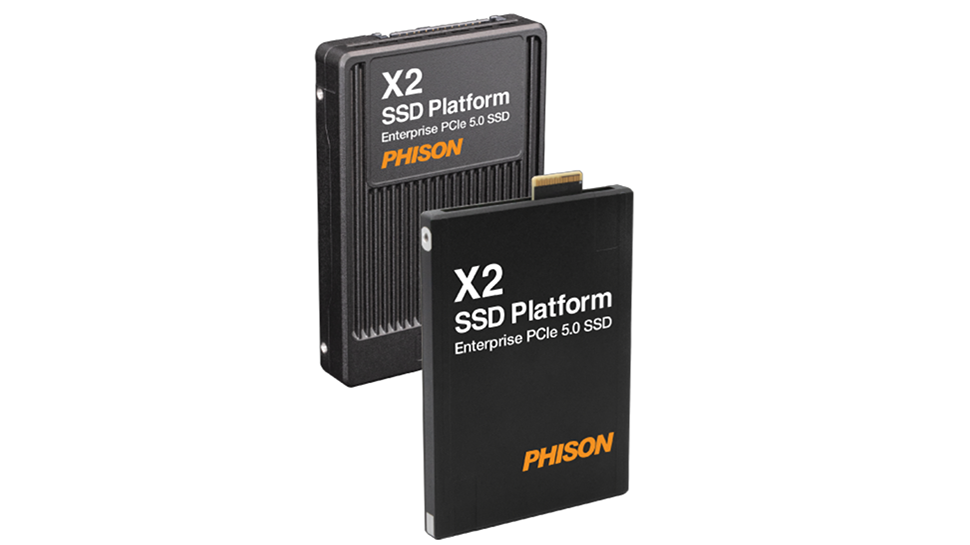More 128TB SSDs are coming as almost no one noticed this launch — another SSD controller that can support up to 128TB appeared paving the way for HDD-beating capacities::Phison quietly revealed an updated X2 SSD platform at CES
as almost no one noticed this launch
That’s because we’re having trouble just getting food. A shiny new and expensive SSD isn’t even on the list at this point.
At that size they are certainly targeting enterprise and cloud servers. Cool that they are getting that big, but they probably cost as much as a house.
deleted by creator
I haven’t. Was it just announced? I loved that series as a kid.
4.5k would be a pretty cheap house.
I think ur off by an order of magnitude (still ur gonna be hard pressed to find a house that cheap)
Ok, but the disk costs 4.5k
I read 128GB SSDs and thought “who cares”
impressive.
That’s cool and all, but the only reason I would want that capacity is to store stuff that I would want to store for much longer than a lifespan of an SSD. Only HDD’s have that kind of lifespan. Like a gigantic video library/archive. I guess these aren’t for me.
But if they drive down the price of high capacity, HDDs, all the better. 
Correct me if I’m wrong here, but I remember that SSDs lifespan mainly depends on how much you overwrite the drive. For 128TB, it should take you a very long time to overwrite the entire drive, let alone couple hundred or thousand times to kill the drive. I know that bit rot also happens on SSDs, but that applies to HDDs as well, and good drive maintenance practices should alleviate the issue. Though for archival purposes/cold storage, tape drives are probably better.
The lifespan of your data isn’t nearly as long as the lifespan of the cells storing your data. Due to leakage of of power from the cells, and the more and more dense these cells are being packed (leading to smaller differences between what voltage maps to what binary value), SSDs have issues with bitrot. With a disk this size you would need to have data regularly checked and refreshed (rewritten) to ensure the data being stored was still correct and not corrupted.
All storage has issues with bit rot. There haven’t been any studies to show that SSD is disproportionately affected.
In 2016, HDDs were more reliable (MTBF).
In 2022, for the first 5 years, SSDs are looking more reliable. With more of a constant failure rate (1%/yr), than the increasing failure rate of HDDs after 5 years.
(Caveat: not just bit rot, but general failure data.)
There’s a caveat there. We’ve had some new tech in SSDs come out very recently, new enough not to be in those charts will still have to see.
What is bit rot?
When bits of data on a storage medium goes bad for seemingly no reason. If you’ve ever had a library of files and all of a sudden there’s a file that won’t open even though you haven’t touched it.
If they are loading the drive up with media for archival purposes how much overwriting are they going to be doing, anyways? Theoretically the drive should last a very long time for that purpose.
Right, but if the point isn’t for the drive to be actively used, and instead just hold data for archiving, then there’s little reason to spend more money to get an SDD for that purpose when an HDD will hold that data just as well and for much cheaper.
The benefits of SSD over HDD are almost entirely in performance, so if SSD can develop further to provide a tangible benefit over HDD for long term storage, and do it for cheaper, then we can fully move away from it. But I don’t think we’re quite there yet.
SSD lifespan is expressed in terabytes written (TBW), wherein yeah they can sustain so many writes to the flash chips before they can’t anymore.
Really depends on the content, type of use, architecture, and the file system. You’re not wrong, some situations would take centuries to wear this guy out.
It’s not for you. It’s for enterprises, but I can drive down the prices of shit you would use. No noise, better performance, less energy; it’s a win-win.
Yeah, that’s what I figured
HDDs typically don’t last as long as SSDs due to their mechanics failing. Data is there but it just won’t spin. I’ve yet to have an SSD actually fail. Every HDD I’ve ever owned, save one, has.
This has not been my experience at all, nor is what I know from general knowledge— that, due to rewriting, SSDs become unusable within 3-5 years, whereas the typical lifespan of an enterprise HDD is 5-7 years, perhaps longer.
In my own use, SSDs of mine seem to crap out around 5-ish years, whereas HDDs get 7+, and the $/GB ratio makes it a no-brainer, esp for video library/archive storage where it’s mostly read/write no rewrite and long-term storage with no need for very high-speed access (like for editing 4/8K).
I buy enterprise HDDs that never spin down and last forever— they use more power, but I don’t pay for that. SSDs wear out just by reading and writing and become unreadable over time.
If I were editing giant chunks of video in 8K, and needed enormously fast cache rates and transfer speeds over thunderbolt 4, obviously, I’d go with the SSDs, especially if I had a studio I was working for that could afford to replace them when they were out. But that’s not my use case.
I had one fail three weeks ago…but I been using it nonstop since 2013. Yeah, it was 128gb
I’ve had at least 8 SSDs fail in various ways personally.
I care about affordable stuf not luxury .
These are not intended for you anyways. They are designed for servers.
It’s still interesting though and server hardware eventually makes it way down to normal people.
I’m holding out upgrading for the holographic nano dark matter drives that have infinite storage capacity and RAID data into 3 alternate universes for security.
Some high tech alien’s porn stash is embedded in the fabric of our universe and that’s the reason we exist.
Are we the porn? Some alien’s weird fetish?
If we are, the story’s gone to shit.
That’s their kink.
We are all lemon-stealing whores
This is why I feel like an interdimensional cumshot all the time.
Damn, Interdimensional cumshot sounds like an obscure metal band.
Realistically, a couple of 10TB drives would have me covered for like a decade at least. If these massive drives bring down the price of much smaller ones, I’m a happy boy.
Yeah I have an old pc. Built it 6 or 7 years ago with a 1080 FTW2 card that is still going strong. For storage I have a wd 1tb drive and a 250gb ssd with windows on it. I’ve been fine for the most part since I don’t watch 4k tv and only really play older games anymore.
I may have just jizzed in my pants
Maybe the price will dry you off.
Too late
That’s some nice density you got there. While you’re at it…
Can I get a 12.8TB drive 1/10th the physical size (m.2 2230) and has a steady transfer rate of 2.4GBs that costs <$200 dollhairs? Pretty please 🙏
Unless you’re using a NUC or similar, M.2 is the worst form factor - and consumer grade drives are all shit. If you’re in the market for storage I’d recommend looking at used enterprise U.2 drives in the 0.5-1 DWPD range. Adapters (PCIe or M.2 to U.2) are super cheap.
Edit: 12.8TB is gonna be a stretch, obviously, but even Solidigm TLC drives are quite a bit better than any consumer grade drives and I’ve seen some of the 7TB models go for surprisingly cheap.
I am using NUCs.
Sir, you forgot a 0 their…
There there. It’s okay.
That’s they’re they’re.
How expensive are they, $100,000 or maybe more?
$4.5k from a quick search.
Edit: I HAVE NO CLUE WHERE THAT NUMBER CAME FROM LAST NIGHT
https://www.tomshardware.com/news/samsung-128tb-petabyte-storage
This states that a 32tb ssd costs roughly $7000
≈$35/TB or ≈3.4¢/GB Actually not a bad deal at all, consider the current SSD prices.
That’s actually pretty reasonable.
I’m going to need a source for that, as it’s well below even regular consumer SSDs.
Like I said, quick search, and unfortunately, I doubt anyone else looked it up. Soooo here is an article that says a 32tb cards goes for about $7000.
https://www.tomshardware.com/news/samsung-128tb-petabyte-storage
Hmm. As a personal user, 9k to not worry about storage space or redundancy, for at least a decade seems like a pretty great deal.
Looks like 40k a pop
deleted by creator
Still can’t afford it.
What’s the biggest HDD out there? I mean at sizes this big it’s a lot of data to lose in one go if it dies. Even if you have backups or whatever that’s a lot to have to restore.
Are we including magnetic tape?
Looks like they hit 580 TB a few years ago: https://www.pcmag.com/news/fujifilm-and-ibm-set-world-record-with-580tb-magnetic-tapes
I like 8TB drives for media. I know the rules of safe backup say you should have 3 copies, but I just have another 8TB drive for each one that’s in use and I do a sync every few months. The backup drives, when not hooked up to sync for backup, sit safely in anti static bags inside the boxes they came in, in a file cabinet drawer.
Who sells 80TB HDDs? None on the market that I know of.
I’ve seen SSDs hit 100TB, but those are $40k+. And more “reasonable” options like 64TB for $10k or so.
HDDs just reached 30TB, but I don’t think those are widely available yet. 24TB is the biggest you can expect to see for sale.
Ok so I’m wondering WTF he’s talking about.
Did he mean 8TB maybe?
I meant 8 TB
You are probably expected to buy like 100+ of these at a time.
Biggest HDDs are like 28TB max atm?
Do you think the normal consumer would care? All that matters is for SSD to become as cheap or cheaper than HDDs or nothing
Capacity that high is for servers.
Or porn
Servers full of porn
Its pretty cool. Number go up is exciting.
Bigger number better
I am coming from Incremental Social, but I agree.
how much?
40k
Man I has to read that 4 times before it registered. Fucking he’ll shits nuts
Call me when they somehow fit this on an SD card in another 10 years
Whatcha talking bout? There are many ads for 128 Tb drive on TEMU and Ali Express! Like for cereal man, they show proper sizes and everything!
.
.
/s if ya didn’t get it
I read it as 128GB. Then I was like, ohhhhhhhh. Sweet!
Given how many years its been since the first 100TB SSD released, anything short of 200TB seems kinda meh. Honestly kinda figured we’d be past the 400TB mark at this point, but I guess those sizes simply aren’t that interesting from a business perspective even if just as a halo product not meant to actually sell much.























